AMMAN, JORDAN: Restoration work has been underway at Jerusalem’s holy sites for almost a century now, with a total of five major initiatives funded by the Hashemite royal family of Jordan.
Ongoing projects in the Old City of Jerusalem, a UNESCO World Heritage site, were brought into focus by a flare-up in tensions in January this year when Israeli police tried to stop renovations to the Dome of the Rock Islamic shrine.
The current monarch, King Abdullah II, has continued his father and great-grandfather’s mission, establishing in 2007 the Hashemite Fund for the Restoration of the Al-Aqsa Mosque and the Dome of the Rock.
In December 2016, an eight-year project to renovate and preserve the mosaics of the Dome of the Rock and the Qibly Mosque concluded with the restoration of about 16 million mosaic tiles — the first such project in 500 years.
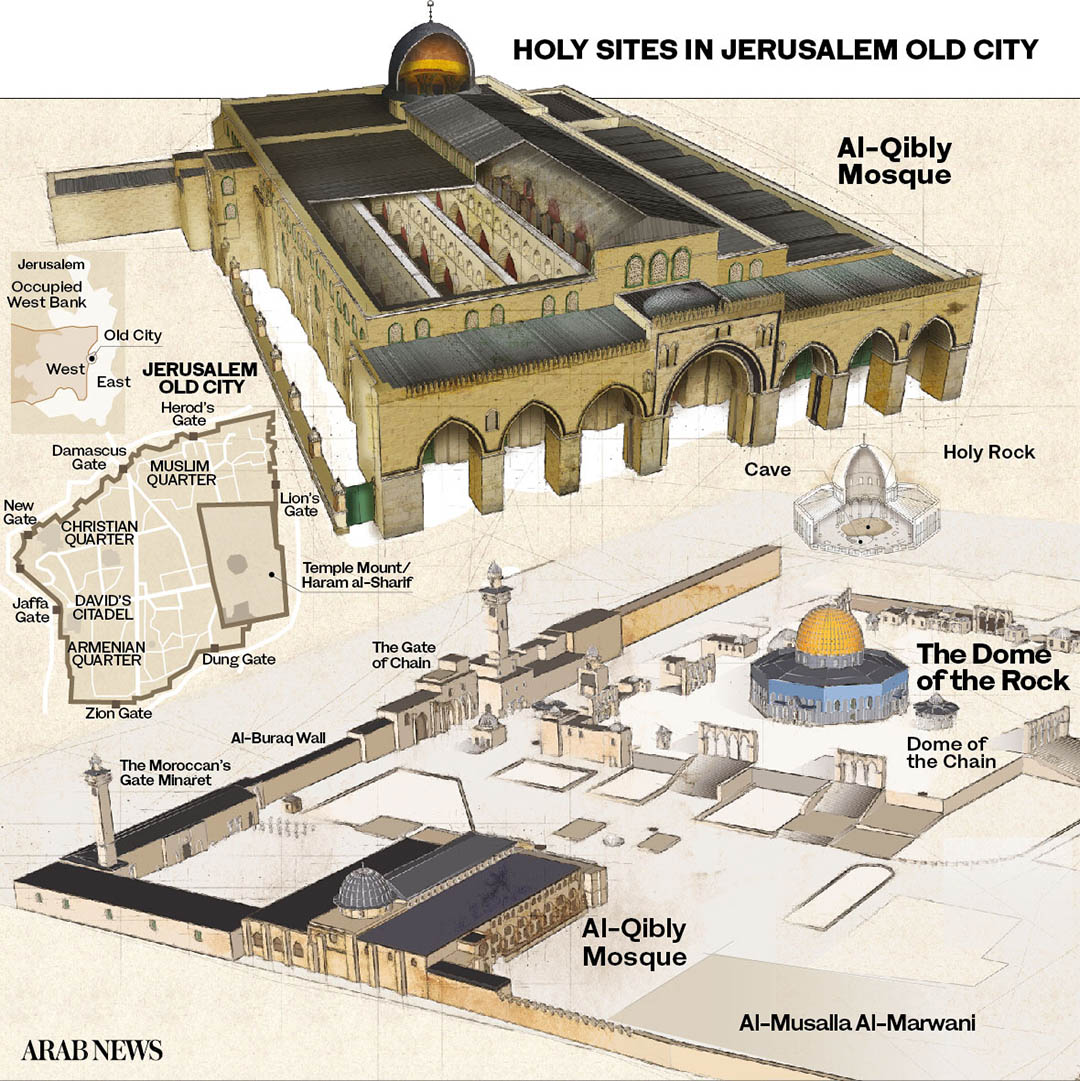
Wasfi Al-Kailani, executive director of the Hashemite Fund, told Arab News that the royal family’s funds have spent nearly JOD 1.5 billion ($2.1 billion) on these projects since 1922.
Al-Aqsa Mosque, also known as the Qibly Mosque, is situated inside the Noble Sanctuary, or Haram al-Sharif, alongside the Dome of the Rock — the iconic gold-capped mosque built on the site where Prophet Muhammad is believed to have ascended to heaven by night on a winged horse.
The Umayyad Caliph Abdel Malik ibn Marwan commissioned its construction and it was completed during the reign of his son, Al-Walid, in the year 705. The UNESCO World Heritage site is one of the three holiest sites in Islam, along with Makkah and Madinah in Saudi Arabia.
However, the Jewish people also lay claim to the same site, known to their faith as the Temple Mount. They believe the mosque is the site of the remains of two destroyed Jewish temples. As a result, to this day the compound remains both a symbolic and a literal flashpoint in the ongoing Israeli-Palestinian problem.
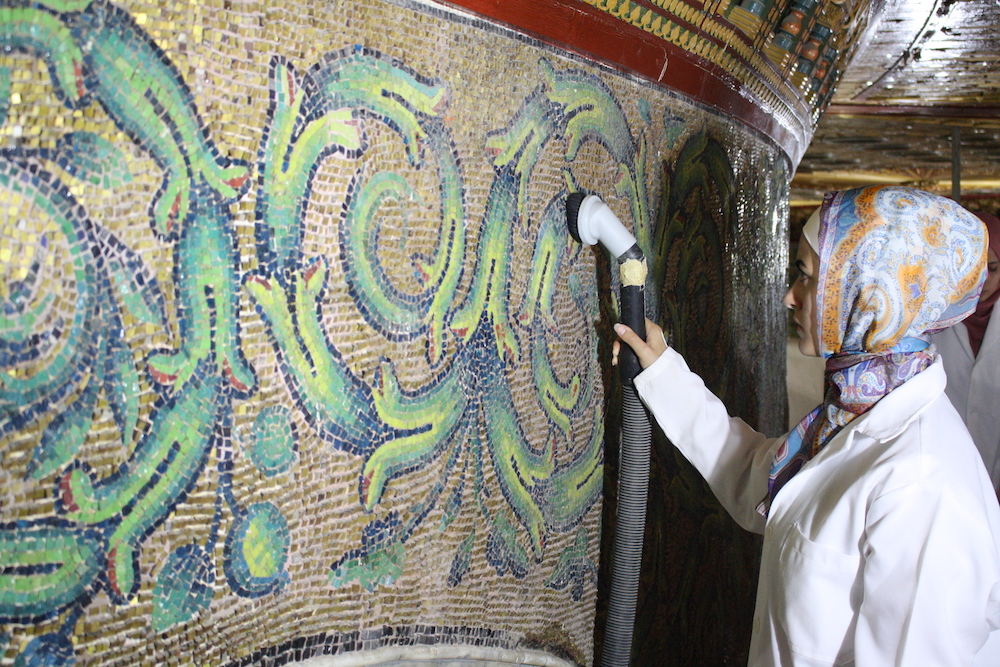
An engineer dry cleaning the mosaic painting after renovating some impaired pieces. (Supplied)
According to international law, the Jerusalem Islamic Waqf, which is directly affiliated with the Jordanian Ministry of Awqaf Islamic Affairs and Holy Places, is the official supervisor of Al-Aqsa Mosque and the endowments of Jerusalem. Jordan still maintains the exclusive right to supervise religious affairs in Jerusalem according to the peace agreement it signed with Israel in 1994.
The first restoration, which began in 1922 and concluded in 1952, saw the Islamic Higher Council (IHC) created to preserve Islamic deals and protect the sanctuaries of Palestine.
Under the leadership of Hajj Amin Al-Husseini, the IHC raised funds to restore the Dome of the Rock. King Abdullah I, the first ruler of Transjordan, personally supervised the restoration work, which included the retiling of ancient artworks.
During the 1948 war, the Old City of Jerusalem, Al-Aqsa Mosque and the roof of the Church of the Holy Sepulcher suffered considerable damage. Immediately after the end of the war, King Abdullah I visited Al-Aqsa and launched the restoration of the Mihrab Zakariah (Niche of the Al-Aqsa).
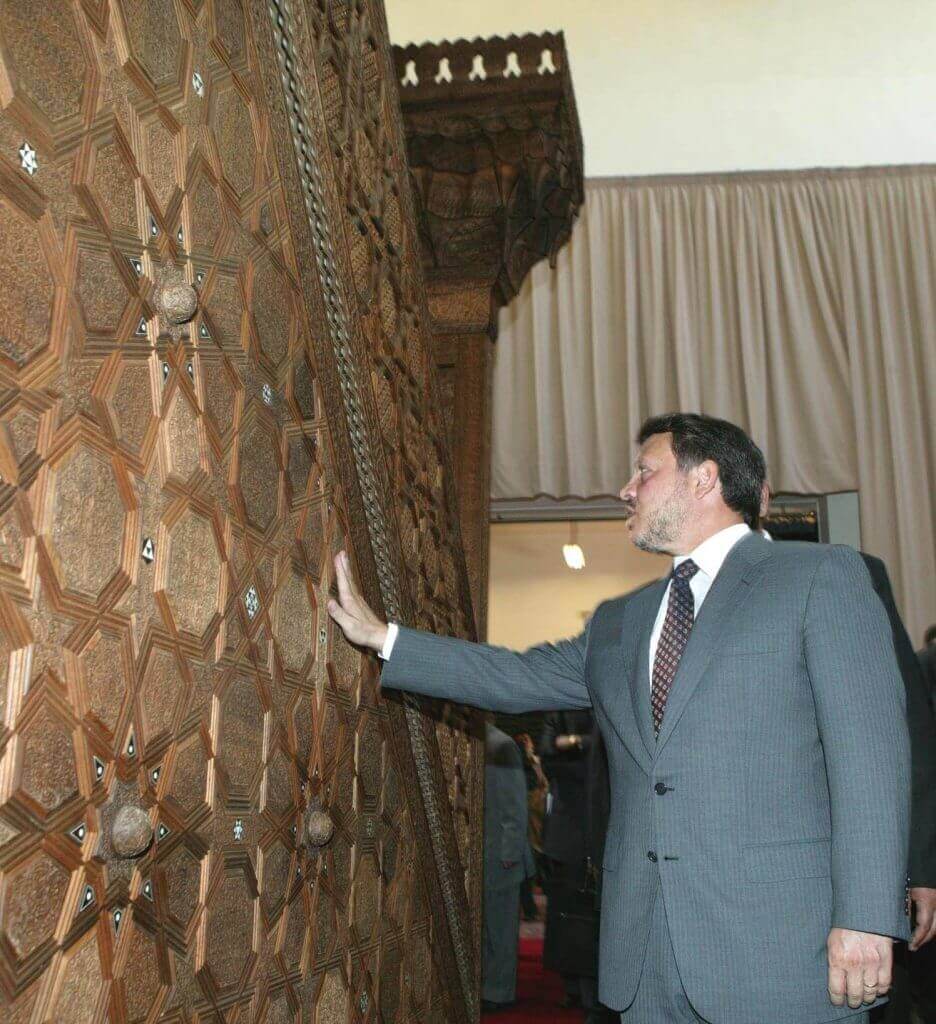
King Abdullah II inspects the final stage of restoring typical copy of Minbar Salhahudeen designed and manufactured in Amman before installing it in Al-Aqsa Qibli Mosque in 2007. (Supplied)
The king was deeply committed to preserving the holy places throughout his reign until his assassination in Qibly Mosque on July 20, 1951.
Abdullah’s grandson, King Hussein, took on the mantle by launching a second wave of restoration efforts from 1952 to 1964 and founding the Jordanian Law of the Hashemite Restoration Committee in 1954.
Over the centuries the Dome of the Rock had lost its golden sheen and was letting in water. The lead plates adorning the dome had to be replaced with aluminum support beams and new gilded plates.
“When Caliph Abdel Malik decided to cover the mosque with gold, he appealed to Muslims to contribute their gold jewelry,” said Al-Kailani.
“Until this day, we see in the transparent offering box in Al-Aqsa Mosque both paper money and jewelry that women contribute to the restoration effort.”
THENUMBER
$2.1 bn
* Money spent by Hashemite funds for the restoration of the Al-Aqsa Mosque/Al-Haram Al-Sharif since 1922.
Some of the most significant restoration work took place in the third cycle after Michael Dennis Rohan, an Australian Christian extremist, attempted to torch the compound’s ancient buildings on Aug. 21, 1969.
The 1,000-year-old wood and ivory carved Saladin pulpit — known as the Minbar of Salah Al-Din — was destroyed in the fire. The pulpit had been brought from Aleppo to Jerusalem by Salah Al-Din himself after his liberation of Jerusalem from the Crusaders in 1187.
Its replacement, designed to resemble the original, was finally installed in 2007 at a cost of $2.115 million to the Jordanian treasury. Repairs to the fire damage are ongoing.
The fourth restoration began in the early 1990s to address weathering and other wear and tear to the Dome of the Rock. Some 1,200 copper and nickel plates, gilded with 24-carat gold, were installed, alongside new roof supports and fireproofing.
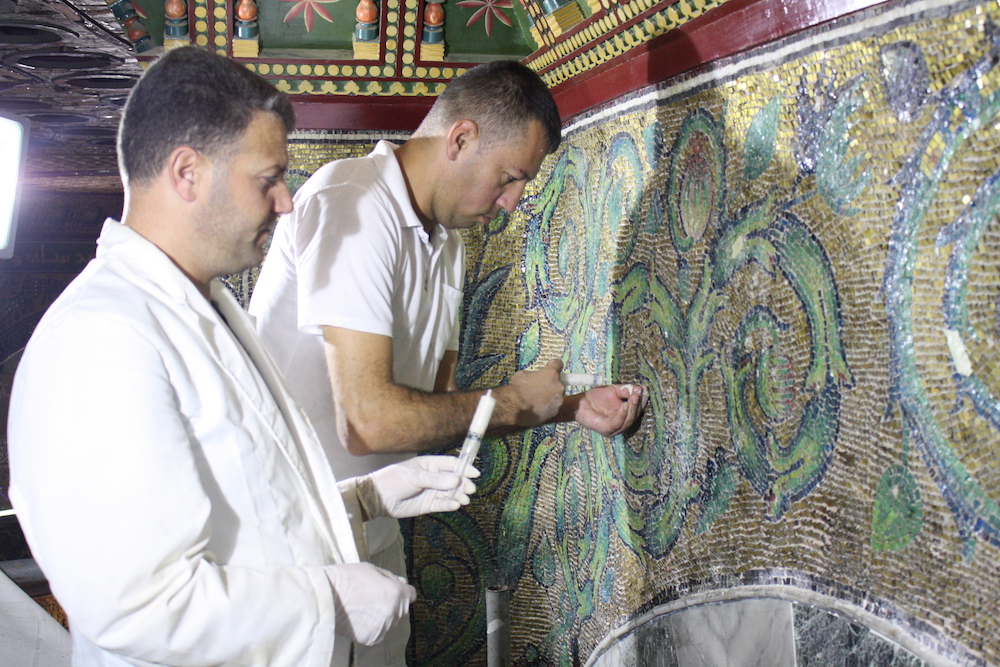
Hashemite Fund Director Dr. Wasfi Kailani and engineer Ra’ef Najem join Awqaf Council members in celebrating the finishing of the 2008-2016 important phase of renovating the mosaic in the Dome of the Rock, July 2016. (Supplied)
“His Majesty the late King Hussein sold his house in Britain for £8.5 million, which he donated to renovate the golden dome with 24-carat golden covering,” said Al-Kailani. The restoration brought back the dome’s glittering splendor.
Even so, in recent years the leak in the roof of the Bab Al-Rahmeh prayer hall had become unbearable. Every time it rained, the wet ceiling would drip onto the heads of Muslim worshippers as they prayed in Bab Al-Rahmeh on the periphery of the Al-Aqsa compound.
Israeli police were repeatedly blocking attempts to repair the roof of the small building, tucked just inside the closed Golden Gate, despite regular appeals by the Jerusalem Islamic Waqf.
Then, on Jan. 22, a Palestinian man, wearing a keffiyeh over his face to conceal his identity from Israeli surveillance cameras, climbed onto the roof of Bab Al-Rahmeh prayer hall and repaired the leak. The Israeli police responded with a ban on restoration work and an embargo on all goods and materials coming into the compound.
Bassam Al-Hallaq, director of Al-Aqsa Mosque’s Hashemite Restoration Department, was outraged by the move, telling Jordan TV’s Eye on Jerusalem program: “I have worked for 40 years and this is the first time that our work has been interrupted.”
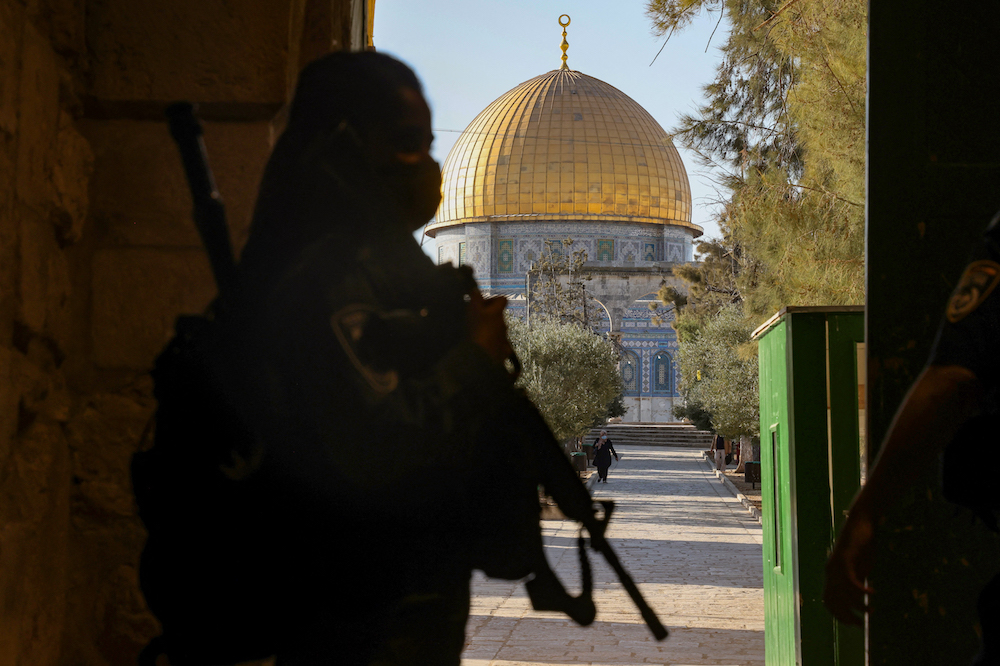
An Israeli policewoman stands guard at an entrance of the al-Aqsa compound, leading to the Dome of the Rock mosque in the Old City of Jerusalem on October 18, 2020, amid the novel coronavirus pandemic crisis. (AFP/File Photo)
Azzam Khatib, the director-general of the Jordanian Jerusalem Waqf and Al-Aqsa Mosque Affairs Directorate, refused to take the embargo lying down. The Waqf Council met and issued a statement condemning the Israeli action.
Omar Kiswani, director of Al-Aqsa Mosque, said that repairing and restoring the entire compound is the right of the Islamic Waqf and that Israeli authorities have no right to interfere.
Khatib also informed Ghassan Majali, Jordan’s ambassador to Israel, and Mohammad Khalaileh, the minister of Waqf in Amman, leading to a strong statement of protest from Jordan’s foreign ministry.
The combined pressure campaign worked. Four days after the ban was imposed, the Israeli authorities rescinded the order, allowing restoration work to continue.
“We were able to return to our regular work and bring in all the needed equipment and items needed,” Al-Hallaq said.
“The challenge of restoration has always been how to safeguard the authentic character of every historic segment of Al-Aqsa,” said Al-Kailani of the Hashemite Fund.
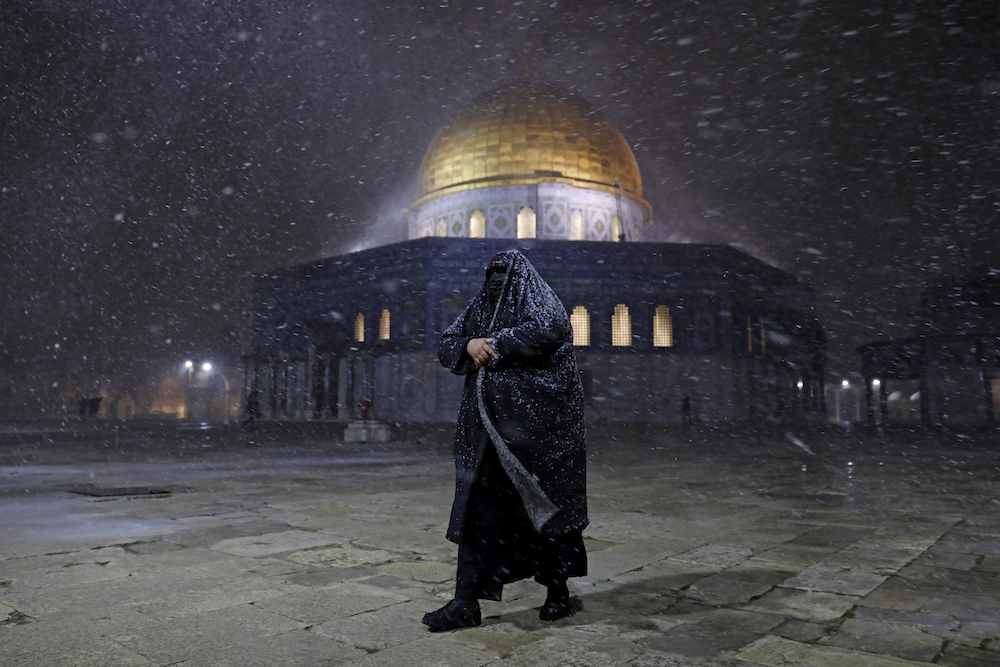
A Palestinian woman walks as snow falls at the Dome of the Rock Mosque in Jerusalem's al-Aqsa mosque compound, on February 17, 2021. (AFP/File Photo)
For his part, Al-Hallaq says many of the restoration projects have faced obstruction by Israeli authorities — and more hurdles are expected in future. In addition to the ban on renovations at Bab Al-Rahmeh, Israel has also prevented any attempts to light up the top of the Dome of the Rock.
“Even before the controversy over the repair of the Bab Al-Rahmeh, Israel had banned some of the work, such as the lighting of the golden dome and the fire extinguishing system inside Al-Aqsa Mosque,” he said.
“We have noticed that the current lighting of the Dome of the Rock doesn’t reach the top areas. We have the money and the plans to erect a lighting system that will allow the illumination of the entire Dome of the Rock, but Israel bans the erection of any towers that are needed to light the dome.”
Al-Hallaq says overcoming these obstacles is an important part of the historic and religious duty of Muslims to defend their holy places.
“When you work as an engineer or artisan here, you are always working at risk from Israel,” he said. “But despite all this, while we suffer from these interventions, we are steadfast and insistent on continuing the restoration efforts.”
-----------------
Twitter: @daoudkuttab
















